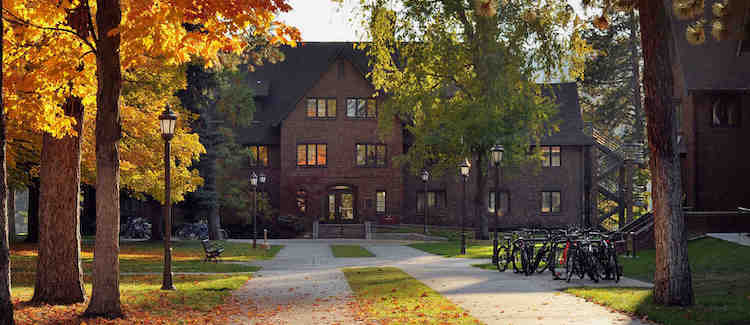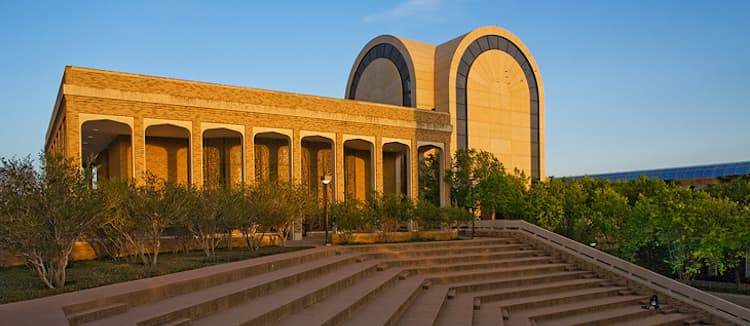Secular Students at Religious Colleges
American college students have become less religious over time. According to the Cooperative Institutional Research Program Freshman Survey, students who identify as non-religious, agnostic, or atheist have risen from 10% in 1986 to 30% in 2016. These numbers are more pronounced at public universities, but even at religious colleges almost 16% of incoming freshmen in 2017 chose “none” when asked about their religious affiliations.
There are 1,700 private nonprofit colleges in the United States and many of them are religiously affiliated. Secular students apply to religiously affiliated colleges for a variety of reasons, including small class sizes, quality of instruction, specialty programs, location, and scholarship or athletic opportunities.
If you are a secular student considering attending one of these schools, you’re probably wondering if you will fit in there. Here’s the good news: Most religious universities in the U.S. are far less strict than their collective reputation implies, and they usually don’t require students to share their views. This article will show you how to assess a university’s religious culture before you apply.
Attending a Religious School That’s Right for You
Religious universities are often as distinct from one another as they are from public schools. Some enforce strict rules or guidelines on student conduct, while other campuses hardly seem religious at all.
Below, we’ve highlighted a few schools with different faith backgrounds in an effort to present the different ways a religious campus can influence student life. The colleges covered here represent common denominations and apply different approaches to incorporating religion in curricula and on campus. This is not a comprehensive analysis; rather, it’s a representative sample meant to depict how life at religious schools can vary between institutions.
Denomination: Church of Jesus Christ of Latter-day Saints (Mormon)
Location: Provo, Utah

Founded in 1875, Brigham Young University (BYU) is a private university owned and operated by the Church of Jesus Christ of Latter-day Saints (LDS), also known as the Mormon Church. In addition to requiring four Bible study courses and enforcing a strict dress code, BYU requires yearly ecclesiastical endorsements for each student.
Members of the LDS church receive a discount of nearly $3,000 per semester. While BYU offers no secular or LGBTQ+ student organizations, it does offer clubs for Jewish and Muslim students. Temple attendance is encouraged but not required. The BYU honor code specifically bans premarital sex and homosexual behavior, and student housing is gender segregated.
Denomination: Presbyterian
Location: Spokane, Washington

Whitworth University was founded in 1890 and maintains an affiliation with the Presbyterian Church. While Christianity plays a role in student culture at Whitworth, the university is lax about enforcing religious perspectives, maintaining that its mission is to educate everybody. Required religion courses include one Bible study class, but the other 12 credits come from other worldview-related courses. There is no dress code, and the behavior code uses gender-neutral language in banning sexual conduct on campus. Student organizations include an LGBT+ club as well as a club for Catholic students and another for pro-life students. There are no official Jewish, Muslim, or secular student organizations. Student housing is co-ed, and attendance at on-campus chapel meetings is optional but encouraged.
Denomination: Episcopalian
Location: Gambier, Ohio

Founded in 1824, Kenyon College is the oldest private college in Ohio. Though the school is a member of the Association of Episcopal Colleges, it actively supports varied spiritual practices among its students through its Episcopal campus ministry, Hillel Jewish community center, and official Catholic, Islamic, Buddhist, and Humanist student organizations. The university also offers a variety of LGBTQ+ clubs. Kenyon does not have a dress code, its residence halls offer co-ed and gender segregated options, and its student code of conduct primarily addresses academic integrity rather than social behavior. There are no required religion or theology courses.
Denomination: Roman Catholic
Location: San Diego, California

Not to be confused with the University of California San Diego, the University of San Diego (USD) is a private, Roman Catholic university. USD does not require church attendance, but does encourage its students to participate in community service missions, often through explicitly Catholic charity organizations. The university officially sponsors student organizations for Muslim and Jewish students, and also hosts an LGBTQ+ student organization. USD has no dress code and its honor code focuses on academic honesty. Students are required to take two classes in “theological and religious inquiry,” which can include philosophy and world studies courses.
Denomination: Church of Christ
Location: Abilene, Texas

Founded in 1906, Abilene Christian University (ACU) in Abilene, Texas has a dress code that requires students to dress “with Christian sensibility” and bans body and facial piercings. While its code of conduct does contain a section on student behavior that explicitly bans all premarital sexual activity, it also bans “language and behaviors that communicate disrespect toward any member of the ACU community.”
There are three required Bible-specific theology courses, and students are heavily encouraged to attend a daily chapel meeting where they receive campus news in addition to spiritual counseling. Students must also earn 55 “spiritual formation credits,” also known as chapel credits, which can be earned through participation in select student organizations or by attending church. Residence halls are gender-segregated, and there are no official student organizations for secular or LGBTQ+ students, or for students belonging to other faiths. The campus is home to a pro-life student organization.
Denomination: Jewish
Location: Waltham, Massachusetts

Brandeis University is an American Jewish university founded in New York City in 1948. Brandeis has several campuses across NYC and an international campus in Israel. There are no required theology courses at Brandeis, though the university does require students to take a course in “cultures over time,” which can be satisfied with a religion credit. Sabbat is observed on campus and students are encouraged to participate, but not required. There is no dress code or student honor code. Residence halls are segregated by gender, and there are no official student organizations for LGBTQ+, secular, or non-Jewish students.
| Brigham Young University | Whitworth University | Kenyon College | University of San Diego | Brandeis University | Abilene Christian University | |
|---|---|---|---|---|---|---|
| Affiliation | Mormon | Presbyterian | Episcopalian | Catholic | Jewish | Church of Christ |
| Honor Code Focus | Behavior-oriented; bans homosexual behavior | Behavior-oriented; no sex, but gender-neutral language | Academic honesty | Academic honesty | None; “Student Bill of Rights” instead | Student behavior |
| Dress Code? | Yes | No | No | No | No | Yes |
| Church Attendance? | Not required | Not required | Not required | Not required | Not required | Chapel credits |
| Required Religious Coursework | 4 specific classes | 1 Bible class; 4 worldview studies classes | None | 2 theological and religious inquiry classes | 1 non-Western philosophy class | 3 specific Bible classes |
| Secular Student Association? | No | No | Yes | No | No | No |
| LGBTQ+ Student Organization? | No | Yes | Yes | Yes | Yes | No |
| Other Religious Student Organization? | Jewish; Muslim | Catholic | Jewish; Catholic; Buddhist; Muslim | Muslim; Jewish | Catholic; Muslim; Buddhist | None |
By identifying schools with strict religious codes and curricula, secular students can make informed choices about where to attend school. The reference points below can help you evaluate schools and find one that’s a good fit for your spiritual needs — or lack thereof.
Coursework
Most religiously affiliated universities have some form of theology-related core credit requirement, so that alone shouldn’t deter you from applying. Instead, check if the school allows you to satisfy theology credits by taking history, philosophy, or literature courses. If the requirement can only be satisfied by a theology class, particularly if it’s a specific course series with a specific worldview, there’s a good chance the student body is similarly homogenous. You might not feel welcome there if you hold a different worldview.
Dress Codes
It is highly unusual even among private schools for a university to have a dress code; the presence of one is a good indicator that religion is a significant part of campus culture. You will likely be more comfortable as a secular student on a campus where there isn’t a dress code, even if you don’t mind conforming to one.
Honor Codes
It is common for universities to have an honor code, but the content matters. If the honor code focuses on academic honesty and includes a section about student rights, then you will likely be able to carve out a space for yourself at that school. If the honor code is strict about limiting student behavior, especially with regards to sexuality and religious practice, you may be better off somewhere else.
Mandatory Services
It is rare for schools to require students to attend a religious service, though it does happen; for example, LeTourneau University requires students to attend at least 18 chapel services, and Oral Roberts University charges students a $50 fine if they miss more than three chapel meetings. However, most religiously affiliated schools allow students to make their own choices about church attendance. Keep an eye out for schools that combine religious services with news announcements, making it impossible to opt out without missing important information.
Is Church Attendance Required?
While church attendance is usually not mandatory, some religious universities require “chapel credits,” which students earn by participating in a minimum number of extracurricular activities. These could include church attendance, Bible study groups, volunteer work, or political action groups, and not all events count toward the credits. If you aren’t religiously inclined, meeting chapel credit requirements could prove burdensome.
Student Organizations
You can learn a lot about a university’s culture from what student organizations it officially sanctions. Religious colleges rarely have a humanist or secular student alliance, so while it’s a good thing to check, don’t let the lack of one turn you off. However, if a school doesn’t have approved organizations for LGBTQ+ students or students who practice other faiths, that’s potentially a sign of a homogenous campus culture. Schools with pro-life student groups but not pro-choice groups also tend to be strict about religious practice.
Student Newspaper
A quick way to get a sense for a particular school’s culture is to peruse the student paper’s opinion section. There, you can see what topics are being discussed on campus and learn more about what the student body values. If there are a lot of diverse opinions expressed from a variety of viewpoints, you can probably find a place at that school. If it seems like most articles cover the finer points of faith-related culture, you might feel out of place as a student with secular values.
Final Thoughts
While popular culture would have you believe that a secular student has no place at a religious school, the reality is that many religiously affiliated colleges are just as open to varied perspectives as public or secular private schools. Keep in mind that there is a lot of variation from campus to campus, even between schools that are affiliated with the same faith. Do your research ahead of time to understand what you are signing up for and you will find a school that suits you.
Explore More College Resources

How to Choose Your College Class Schedule
Learn how to create the best class schedule each semester by considering important academic and nonacademic factors.

by Steve Bailey
Updated March 22, 2023

Full-Time vs. Part-Time Student: What’s the Difference?
Discover the challenges and opportunities full-time vs. part-time students face and get tips on which college experience is right for you.

by Marisa Upson
Updated October 12, 2023

Summer Semester: When Does It Start? And Should You Enroll?
School’s out — or, rather, in — for summer. Discover the pros and cons of enrolling in an optional summer semester in college.

by Anne Dennon
Updated March 20, 2023